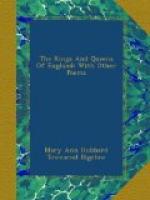And independent of rulers over the sea.
At length death relieved him, and he was cut down,
To make way for his eldest and libertine son.
But though of talent acknowledged the son possessed more,
The sire’s heart was good, the son’s corrupt at the core;
Though admired for his beauty, and manners, and wit,
As a husband and father he never was fit.
But before we pass on to the next reign in course,
We have a most sorrowful tale to rehearse,
Of the young princess Charlotte, next heir to the crown,
In the spring time of life, scarce with warning cut down.
If ever the nation were mourners sincere,
’Twas when they united around the sad bier
Of this youthful princess so deservedly dear;
And stout-hearted men unaccustomed to mourn,
Let bitter tears fall, as they gazed on her urn.
But who can describe the anguish of one,
The heart-stricken husband apart and alone.
As the sun of his happiness rose to its height,
Death enters his dwelling, and lo! it is night;
The light of his house forever has fled,
For his loved one, his dearest, lies low with the dead.
In the same day all his fair prospects were crossed,
When a wife, and a son, and a kingdom he lost.
Next William the fourth, is proclaimed Britain’s king,
For between him and his brother two deaths intervene.
No legitimate child did he leave in possession
Of the Crown of old England, in right of succession;
So the diadem passed to the youthful brow
Of his niece Queen Victoria, who honors it now;
And for her we wish, as our rhyming we close,
A long, peaceful reign—an old age of repose.
Written while on a visit at Brooklyn, N.Y., 1851.
TO MY DAUGHTER ELIZABETH.
Two flowers upon one parent stem
Together bloomed for many days.
At length a storm arose, and one
Was blighted, and cut down at noon.
The other hath transplanted been,
And flowers fair as herself hath borne;
She too has felt the withering storm,
Her strength’s decayed, wasted her form.
May he who hears the mourner’s prayer,
Renew her strength for years to come;
Long may He our Lilly spare,
Long delay to call her home.
But when the summons shall arrive
To bear this lovely flower away,
Again may she transplanted be
To blossom in eternity.
There may these sisters meet again,
Both freed from sorrow, sin, and pain;
There with united voices raise,
In sweet accord their hymns of praise;
Eternally his name t’ adore,
Who died, yet lives forevermore.
Weston, Jan. 3, 1852.
ACROSTIC.
For thee, my son, a mother’s earnest prayer
Rises to Heaven each day from heart sincere,
Anxiously seeking what concerns thee most;
Not merely earthly good for thee she prays,
Knowledge, or wealth, or fame, or length of days,
What shall these profit, if the soul be lost.




